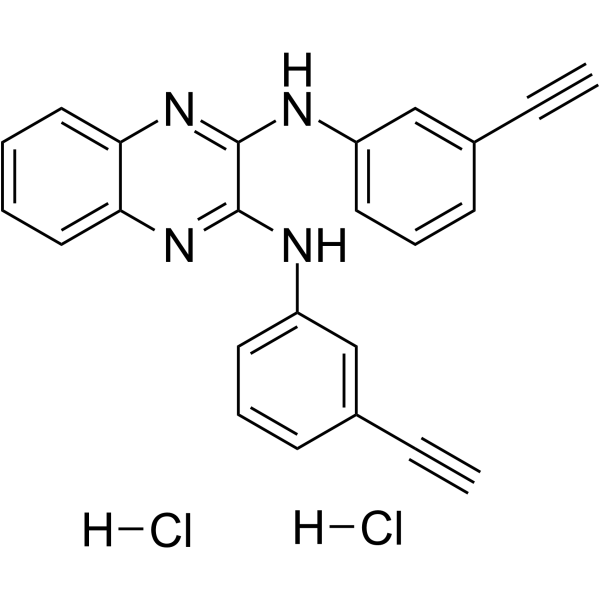TD52 dihydrochloride |
| Catalog No.GC64936 |
Le dichlorhydrate de TD52, un dérivé de l'erlotinib, est un puissant inhibiteur cancéreux actif par voie orale de la protéine phosphatase 2A (CIP2A). Le dichlorhydrate de TD52 médie l'effet apoptotique dans les cellules du cancer du sein triple négatif (TNBC) via la régulation de la voie de signalisation CIP2A/PP2A/p-Akt. Le dichlorhydrate de TD52 a indirectement réduit CIP2A en perturbant la liaison d'Elk1 au promoteur CIP2A. Le dichlorhydrate de TD52 a moins d'inhibition du p-EGFR et a une puissante activité anticancéreuse.
Products are for research use only. Not for human use. We do not sell to patients.

Sample solution is provided at 25 µL, 10mM.
TD52 dihydrochloride, an Erlotinib derivative, is an orally active, potent cancerous inhibitor of protein phosphatase 2A (CIP2A) inhibitor. TD52 dihydrochloride mediates the apoptotic effect in triple-negative breast cancer (TNBC) cells via regulating the CIP2A/PP2A/p-Akt signalling pathway. TD52 dihydrochloride indirectly reduced CIP2A by disturbing Elk1 binding to the CIP2A promoter. TD52 dihydrochloride has less p-EGFR inhibition and has potent anti-cancer activity[1].
TD52 dihydrochloride (2-10 μM; 48 hours) shows anti-proliferative ability and induces differential apoptotic effects in these cell lines[1]. TD52 dihydrochloride (5 μM; 48 hours) has minimal effects on p-EGFR or EGFR expression but downregulated CIP2A expression[1]. TD52 dihydrochloride (2.5, 5, 7.5 μM; 48 hours) time-dependently induces apoptosis accompanied with downregulating CIP2A and p-Akt[1]. TD52 dihydrochloride (5 μM; 24 hours) significantly increases the phosphatase activity of PP2A in TNBC cells[1]. TD52 dihydrochloride (5 μM; 48 hours) has no obvious effects on other common RTKs, such as IGFR, PDGFR and VEGFR2[1].
TD52 dihydrochloride (10 mg/kg/day; oral gavage; for 52 days) significantly inhibits MDA-MB-468 xenograft tumour size and tumour weight[1].
[1]. Chun-Yu Liu, et al. EGFR-independent Elk1/CIP2A signalling mediates apoptotic effect of an erlotinib derivative TD52 in triple-negative breast cancer cells. Eur J Cancer. 2017 Feb;72:112-123.
Average Rating: 5 (Based on Reviews and 30 reference(s) in Google Scholar.)
GLPBIO products are for RESEARCH USE ONLY. Please make sure your review or question is research based.
Required fields are marked with *




















